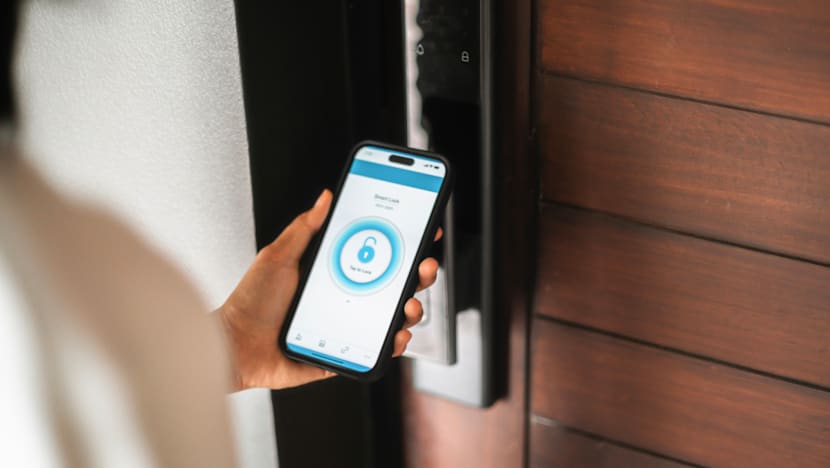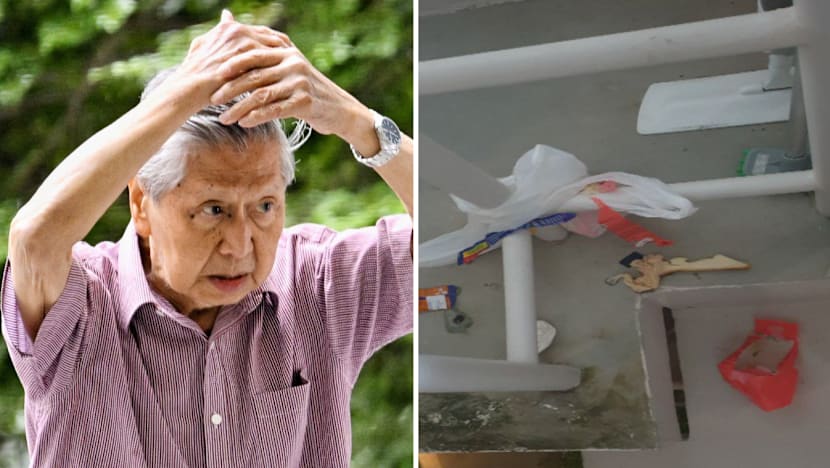- Joined
- Sep 2, 2023
- Messages
- 5,481
- Points
- 113
Continue buying more Xiaomi/TP-Link/Huawei shit at your own risk
https://www.channelnewsasia.com/sin...ne-shopee-lazada-oem-mechanical-locks-5474906
Skip to main content


A person using a smartphone app to unlock a smart door lock. (File photo: iStock/ATHVisions)
Natasha Ganesan
20 Nov 2025 06:00AM (Updated: 20 Nov 2025 10:40AM)
Read a summary of this article on FAST.
FAST
SINGAPORE: Boasting features like facial recognition and fingerprint authentication, smart digital locks have become a common sight on the doors of Singapore homes in recent years.
But some home owners are switching back to the traditional lock and key after being frustrated by malfunctioning devices that they bought on the cheap from online platforms, several locksmiths told CNA.
Smart door locks - electronic devices that connect to wireless networks or Bluetooth and can be controlled through mobile apps - have surged in popularity since 2020, a trend noticed by locksmiths here.
Many who bought these devices prefer the convenience of keyless entry, particularly those who do not like carrying keys around or tend to lose them, while others jump on the bandwagon after seeing family and friends make the switch.
While these devices may work well initially, some locksmiths have observed an uptick of faulty smart locks after they have been used over a period of time, at times involving cheaper models made by original equipment manufacturers (OEM) outside of Singapore sold under different brand names.
These often end up being of low quality and customers struggle without knowing who to turn to for support, leaving some with little choice but to revert to mechanical locks, several locksmiths that CNA spoke to said.
Vincent Locksmith manager DeanJean Phng said home owners end up paying more to replace these locks, and in some cases, need to replace their entire main door.
The cost for Housing Board flat main doors, including those that must be fire-rated to withstand fire and smoke, can range from S$600 to S$1,880 (US$460 to US$1,440).
Between Jan 1 and Nov 11, 2025, the Consumers Association of Singapore (CASE) received four complaints about smart locks — up from none the previous year, said president Melvin Yong in response to CNA's queries.
The complaints involved extra charges for the purchase and installation of locks due to a change in authorised distributors, battery problems and locks failing to meet expectations.
In August, more than 50 people were locked out of their homes after their smart locks were remotely disabled, following a dispute between a local distributor and a Chinese manufacturer.
On Shopee and Lazada, smart locks can be bought for under S$100 (US$76), with more advanced models costing more than S$1,000.
Several tout features such as facial recognition, fingerprint scanning and card access to unlock the door. One listing CNA checked had palm recognition, while another boasted compatibility with a smart app that can be prompted by voice.
To find out how often these smart locks run into problems, CNA spoke to four locksmiths, who said that they regularly hear complaints from residents about the devices.
Ms Phng from Vincent Locksmith gets at least one call a day about faulty smart locks, mostly because the batteries needed to power the smart locks have failed as they were not switched out or were depleted due to hardware issues.
If it is the latter, some home owners might opt for replacing the lock with the same model, but there is a chance that the model might no longer be restocked, said Ms Phng. As such, they will need to purchase another smart lock model, which can involve modifying the front door.
Home owners then become "fed up with the ballooning costs" from the constant issues with their smart locks, said Ms Phng.
That is why several customers would rather just revert to mechanical locks, she said.
Besides battery issues, there are also concerns about build quality as slamming doors can also damage the motor or electronic circuits.
Misaligned installations are another frequent cause of malfunction, said Mr Rajiv Kesavan of Infinite Locksmith and Digital Locks.
On the issue of installation, First Locks' founder and director Mr Joseph Tan said about three in 10 customers have complained to him about low-quality smart locks made by OEMs that can be found on e-commerce sites such as Shopee, Lazada and Taobao.
Some sellers on these platforms offer installation services. But home owners typically have to engage locksmiths on their own to install the devices, he said.
But about 70 per cent of the time, Mr Tan has to decline to install these locks as the devices do not fit the slots on the doors meant for locks.
"There'll be more damage to the door (if we try to install it). So we try not to do it for the customer," he added.
Even if these smart locks are installed, customers have few avenues of support when problems arise.
OEM smart locks do not have the after-sales support that established lock manufacturers do, said Mr Tan, adding that sellers on the online platforms can also be unresponsive.
Echoing this, Mr Alex Heng, director of Interlock Singapore, said there were limited support windows provided for by e-commerce platforms.
"You go back to the platform, (the) platform will not entertain you. You have to go back to the brand," he said.
It is not just about buying cheap, off-the-shelf smart locks. There are many other factors that have to be considered as well, Mr Heng added.
While this can pose a cybersecurity risk, it has yet to be a problem here, said locksmiths.
Nevertheless, Vincent Locksmith's Ms Phng said smart locks are not secure as mechanical ones as they use wireless technologies like radio frequency identification (RFID) - which uses radio waves to automatically identify and track tags attached to objects - and Wifi, which have vulnerabilities.
Referring to the case from August, she said third parties like manufacturers and distributors can also disable access or gain entry to these locks remotely.
This is not an issue in itself as manufacturers need to be able to provide software updates to the devices, but bad actors may gain access through the internet and be able to manipulate or even bypass the lock.
Home owners often do not know who has control over their locks, she said.
"These smart locks are proprietary systems. Although you own the lock, you don't really own it," said Ms Phng.
There have also been instances of smart locks with facial recognition tech wrongly identifying home owners. In China, tech company Xiaomi's smart lock misinterpreted a delivery person's face as the user and automatically opened the door.
The incident which took place in August drew attention online, with Xiaomi saying it would arrange for an after-sales technician to inspect the lock and a specialist to follow up with the customer.
The locksmiths CNA spoke to said they had not encountered cases in which a home owner's home security was compromised by smart locks.
Mr Kesavan of Infinite Locksmith and Digital Locks said most reputable brands have strong encryption and updated firmware to prevent unauthorised access. He however also cautioned that users should still be mindful to keep their apps updated and enable security features like PIN or fingerprint verification.
In any case, cybersecurity failures can arise as a result of a software bug or failure of an electronic component. But in the experience of Mr Heng from Interlock Singapore, the occurrence rate for such issues is likely to be "very small".
"It doesn't mean that the whole industry ... is unsafe."
A Cyber Security Agency of Singapore (CSA) spokesperson pointed to an advisory on protecting IoT devices like smart locks, which lists common vulnerabilities such as weak passwords, insecure interfaces, and poor data protection.
The agency also advised users to assess whether their devices need to be connected to the internet, and to buy from reputable manufacturers that follow industry standards and best practices for IoT security.
"Securing IoT devices is a multifaceted process that requires proactive measures to mitigate potential risks effectively," said CSA.
By addressing the vulnerabilities and implementing safeguards, consumers can better protect themselves from evolving threats, it added.
Source: CNA/ng(nj)
Subscribe here






Amos Yee was sentenced to jail in December 2021 after pleading guilty to charges of possessing child pornography and grooming. (Photos: Illinois Department of Corrections)
20 Nov 2025 09:37PM (Updated: 20 Nov 2025 09:38PM)
Read a summary of this article on FAST.
FAST
SINGAPORE: Singaporean Amos Yee was on Thursday (Nov 20) released from a United States prison on parole.
Yee, now 27, was serving time at Danville Correctional Center in Illinois after being sentenced in 2021 to six years’ jail by a US court for possessing child pornography and grooming.
According to a victim's information network, Yee had been released on Nov 7 and immediately taken back into custody.
He was then released again on Nov 20 at about 7.15am (9.15pm Singapore time).
Yee has been registered as a sex offender, according to checks on the Illinois State Police’s offender registry.
This is not the first time he has been released on parole.
In October 2023, Yee was granted parole halfway through his six-year sentence. But he was taken back into custody about a month later for violating parole conditions.
Yee was sentenced on Dec 3, 2021, after pleading guilty to grooming a 14-year-old girl online and asking her for naked pictures of herself.
Another 16 charges were dismissed as part of a plea deal that Yee agreed to, and his jail term was backdated to his arrest in October 2020.
The court heard previously that Yee, then 20, had befriended the victim in February 2019.
They began an “online courtship”, during which he repeatedly asked for her naked photos.
On occasions, he asked her to engage in roleplay and “sexual fantasies”, said the prosecution. This was despite the victim telling him that she was 14 years old, and it went on until July 2019.
The court heard that he had used WhatsApp to “seduce, solicit and lure” the victim, then distributed photographs of her online.
Yee was arrested by US marshals at his apartment in Chicago’s Norwood Park East neighbourhood.
It has been more than eight years since Yee was granted asylum by a US immigration court, despite opposition from the Department of Homeland Security.
In 2015, Yee was jailed in Singapore for wounding religious feelings by making remarks about Christians.
About a year later, Yee was jailed again and fined on a similar charge, this time for making remarks about Christians and Muslims.
Source: CNA/mi
Subscribe here









https://www.channelnewsasia.com/sin...ne-shopee-lazada-oem-mechanical-locks-5474906
Skip to main content

CNAR Search menu
CNAR Primary Menu
CNAR Secondary Menu
Singapore
Locksmiths caution against cheap but unreliable smart locks as some home owners switch back to keys
Locksmiths also highlighted the lack of customer support available for home owners who purchase off-the-shelf smart locks from e-commerce platforms. 
A person using a smartphone app to unlock a smart door lock. (File photo: iStock/ATHVisions)
Natasha Ganesan
20 Nov 2025 06:00AM (Updated: 20 Nov 2025 10:40AM)
Read a summary of this article on FAST.
FAST
SINGAPORE: Boasting features like facial recognition and fingerprint authentication, smart digital locks have become a common sight on the doors of Singapore homes in recent years.
But some home owners are switching back to the traditional lock and key after being frustrated by malfunctioning devices that they bought on the cheap from online platforms, several locksmiths told CNA.
Smart door locks - electronic devices that connect to wireless networks or Bluetooth and can be controlled through mobile apps - have surged in popularity since 2020, a trend noticed by locksmiths here.
Many who bought these devices prefer the convenience of keyless entry, particularly those who do not like carrying keys around or tend to lose them, while others jump on the bandwagon after seeing family and friends make the switch.
While these devices may work well initially, some locksmiths have observed an uptick of faulty smart locks after they have been used over a period of time, at times involving cheaper models made by original equipment manufacturers (OEM) outside of Singapore sold under different brand names.
These often end up being of low quality and customers struggle without knowing who to turn to for support, leaving some with little choice but to revert to mechanical locks, several locksmiths that CNA spoke to said.
Vincent Locksmith manager DeanJean Phng said home owners end up paying more to replace these locks, and in some cases, need to replace their entire main door.
The cost for Housing Board flat main doors, including those that must be fire-rated to withstand fire and smoke, can range from S$600 to S$1,880 (US$460 to US$1,440).
Between Jan 1 and Nov 11, 2025, the Consumers Association of Singapore (CASE) received four complaints about smart locks — up from none the previous year, said president Melvin Yong in response to CNA's queries.
The complaints involved extra charges for the purchase and installation of locks due to a change in authorised distributors, battery problems and locks failing to meet expectations.
In August, more than 50 people were locked out of their homes after their smart locks were remotely disabled, following a dispute between a local distributor and a Chinese manufacturer.
SMART LOCK FAILURES CAN BECOME ROUTINE FOR SOME
As it is often a case of caveat emptor (Latin for buyers' beware), not all who purchase these cheap home security devices seek recourse through the authorities.On Shopee and Lazada, smart locks can be bought for under S$100 (US$76), with more advanced models costing more than S$1,000.
Several tout features such as facial recognition, fingerprint scanning and card access to unlock the door. One listing CNA checked had palm recognition, while another boasted compatibility with a smart app that can be prompted by voice.
To find out how often these smart locks run into problems, CNA spoke to four locksmiths, who said that they regularly hear complaints from residents about the devices.
Ms Phng from Vincent Locksmith gets at least one call a day about faulty smart locks, mostly because the batteries needed to power the smart locks have failed as they were not switched out or were depleted due to hardware issues.
If it is the latter, some home owners might opt for replacing the lock with the same model, but there is a chance that the model might no longer be restocked, said Ms Phng. As such, they will need to purchase another smart lock model, which can involve modifying the front door.
Home owners then become "fed up with the ballooning costs" from the constant issues with their smart locks, said Ms Phng.
That is why several customers would rather just revert to mechanical locks, she said.
Besides battery issues, there are also concerns about build quality as slamming doors can also damage the motor or electronic circuits.
Misaligned installations are another frequent cause of malfunction, said Mr Rajiv Kesavan of Infinite Locksmith and Digital Locks.
On the issue of installation, First Locks' founder and director Mr Joseph Tan said about three in 10 customers have complained to him about low-quality smart locks made by OEMs that can be found on e-commerce sites such as Shopee, Lazada and Taobao.
Some sellers on these platforms offer installation services. But home owners typically have to engage locksmiths on their own to install the devices, he said.
But about 70 per cent of the time, Mr Tan has to decline to install these locks as the devices do not fit the slots on the doors meant for locks.
"There'll be more damage to the door (if we try to install it). So we try not to do it for the customer," he added.
Even if these smart locks are installed, customers have few avenues of support when problems arise.
OEM smart locks do not have the after-sales support that established lock manufacturers do, said Mr Tan, adding that sellers on the online platforms can also be unresponsive.
Echoing this, Mr Alex Heng, director of Interlock Singapore, said there were limited support windows provided for by e-commerce platforms.
"You go back to the platform, (the) platform will not entertain you. You have to go back to the brand," he said.
It is not just about buying cheap, off-the-shelf smart locks. There are many other factors that have to be considered as well, Mr Heng added.
CYBERSECURITY RISK
Like many smart home devices, a smart lock is considered an Internet of Things (IoT) device as it can be connected to the internet for added functionality.While this can pose a cybersecurity risk, it has yet to be a problem here, said locksmiths.
Nevertheless, Vincent Locksmith's Ms Phng said smart locks are not secure as mechanical ones as they use wireless technologies like radio frequency identification (RFID) - which uses radio waves to automatically identify and track tags attached to objects - and Wifi, which have vulnerabilities.
Referring to the case from August, she said third parties like manufacturers and distributors can also disable access or gain entry to these locks remotely.
This is not an issue in itself as manufacturers need to be able to provide software updates to the devices, but bad actors may gain access through the internet and be able to manipulate or even bypass the lock.
Home owners often do not know who has control over their locks, she said.
"These smart locks are proprietary systems. Although you own the lock, you don't really own it," said Ms Phng.
There have also been instances of smart locks with facial recognition tech wrongly identifying home owners. In China, tech company Xiaomi's smart lock misinterpreted a delivery person's face as the user and automatically opened the door.
The incident which took place in August drew attention online, with Xiaomi saying it would arrange for an after-sales technician to inspect the lock and a specialist to follow up with the customer.
The locksmiths CNA spoke to said they had not encountered cases in which a home owner's home security was compromised by smart locks.
Mr Kesavan of Infinite Locksmith and Digital Locks said most reputable brands have strong encryption and updated firmware to prevent unauthorised access. He however also cautioned that users should still be mindful to keep their apps updated and enable security features like PIN or fingerprint verification.
In any case, cybersecurity failures can arise as a result of a software bug or failure of an electronic component. But in the experience of Mr Heng from Interlock Singapore, the occurrence rate for such issues is likely to be "very small".
"It doesn't mean that the whole industry ... is unsafe."
A Cyber Security Agency of Singapore (CSA) spokesperson pointed to an advisory on protecting IoT devices like smart locks, which lists common vulnerabilities such as weak passwords, insecure interfaces, and poor data protection.
The agency also advised users to assess whether their devices need to be connected to the internet, and to buy from reputable manufacturers that follow industry standards and best practices for IoT security.
"Securing IoT devices is a multifaceted process that requires proactive measures to mitigate potential risks effectively," said CSA.
By addressing the vulnerabilities and implementing safeguards, consumers can better protect themselves from evolving threats, it added.
Source: CNA/ng(nj)
Sign up for our newsletters
Get our pick of top stories and thought-provoking articles in your inboxSubscribe here

Related Topics
smart deviceAlso worth reading

Woman who made construction workers hold up placards demanding payment fined, along with husband

Singaporean Amos Yee released on parole from US prison

Man, 88, fined by court for repeatedly lifting rubbish onto neighbour's air-conditioning ledge

Man used altered PayNow screenshot to buy Viagra and paid phone bills with cheques that bounced, gets jail
Singapore
Singaporean Amos Yee released on parole from US prison
Amos Yee was sentenced in 2021 on charges of possessing child pornography and grooming.
Amos Yee was sentenced to jail in December 2021 after pleading guilty to charges of possessing child pornography and grooming. (Photos: Illinois Department of Corrections)
20 Nov 2025 09:37PM (Updated: 20 Nov 2025 09:38PM)
Read a summary of this article on FAST.
FAST
SINGAPORE: Singaporean Amos Yee was on Thursday (Nov 20) released from a United States prison on parole.
Yee, now 27, was serving time at Danville Correctional Center in Illinois after being sentenced in 2021 to six years’ jail by a US court for possessing child pornography and grooming.
According to a victim's information network, Yee had been released on Nov 7 and immediately taken back into custody.
He was then released again on Nov 20 at about 7.15am (9.15pm Singapore time).
Yee has been registered as a sex offender, according to checks on the Illinois State Police’s offender registry.
This is not the first time he has been released on parole.
In October 2023, Yee was granted parole halfway through his six-year sentence. But he was taken back into custody about a month later for violating parole conditions.
Yee was sentenced on Dec 3, 2021, after pleading guilty to grooming a 14-year-old girl online and asking her for naked pictures of herself.
Another 16 charges were dismissed as part of a plea deal that Yee agreed to, and his jail term was backdated to his arrest in October 2020.
The court heard previously that Yee, then 20, had befriended the victim in February 2019.
They began an “online courtship”, during which he repeatedly asked for her naked photos.
On occasions, he asked her to engage in roleplay and “sexual fantasies”, said the prosecution. This was despite the victim telling him that she was 14 years old, and it went on until July 2019.
The court heard that he had used WhatsApp to “seduce, solicit and lure” the victim, then distributed photographs of her online.
Yee was arrested by US marshals at his apartment in Chicago’s Norwood Park East neighbourhood.
It has been more than eight years since Yee was granted asylum by a US immigration court, despite opposition from the Department of Homeland Security.
In 2015, Yee was jailed in Singapore for wounding religious feelings by making remarks about Christians.
About a year later, Yee was jailed again and fined on a similar charge, this time for making remarks about Christians and Muslims.
Source: CNA/mi
Sign up for our newsletters
Get our pick of top stories and thought-provoking articles in your inboxSubscribe here

Related Topics
Amos Yee United States CrimeAlso worth reading

Benz Hui death: Hong Kong stars Elena Kong, Sharon Chan and more pay tribute to veteran actor

Singaporean actress Julie Tan announces breakup with content creator Douglas Tan

Actor Benjamin Heng remarries, 6 years after first wife's death

Man, 88, fined by court for repeatedly lifting rubbish onto neighbour's air-conditioning ledge
Expand to read the full story
CNA Sections- Asia
- Singapore
- Business
- CNA Insider
- Lifestyle
- Luxury
- TODAY
- CNA938 Live
- Commentary
- Interactives
- Live TV
- Sport
- Special Reports
- World
- Newsletters
Copyright© Mediacorp 2025. Mediacorp Pte Ltd. All rights reserved.
Official Domain | Terms & Conditions | Privacy Policy | Report Vulnerability | Online Links Policy
Official Domain | Terms & Conditions | Privacy Policy | Report Vulnerability | Online Links Policy




